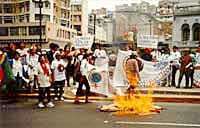April 2002 - Snapshots of Home and Elsewhere - The Americas
 |
|
An unprecedented mobilizationWomen in Latin American countries and the Caribbean participated enthusiastically and energetically in the March. Women in this region bear the brunt of neoliberal economic policies, structural adjustment and debt reduction programs that have been imposed by international organizations. "We are those small traders who throng the streets trying to meet our family's needs because most of us are our family's sole provider," declared the delegate from Haiti on October 16, 2000, during the meeting with the IMF. Mobilization was strong on the island. Women indicated support for the March on cardboard sheets symbolizing the hastily built shelters in which they are forced to live.

Haitian women denounce precarious housing by sleeping on pieces of cardboard.National mobilizingIn Mexico and Brazil, the most populous countries of Latin America, women organized a continuous series of diverse activities that reached women in rural organizations and working class neighbourhoods. In early October 2000, in Mexico, 200 women from 15 different groups formed a caravan. After leaving from Chiapas, they passed through Minatitlán, Veracruz, Mexico City, Monterrey, and Texas, finally arriving in Washington D.C. In Mexico, the March began with a public consultation on women's rights. At the same time, women organized popular education workshops, training sessions and local actions. "The March helped raised awareness of the need for change in relations between women and men," says a member of the coordinating body. Women in Brazil were very active and carry on their actions today: cultural performances; regional marches to protest the government's economic policy, defend the health system, and demand that the murderers and attackers of women be punished; petitions; the March of the Margaridas (rural women); and participation with women from other countries in the World Social Forums of 2001 and 2002. The themes of their actions were echoed elsewhere: in Bolivia, Honduras, Panama, and Ecuador where Indigenous women took part in the struggle against the corrupt regimes that are relentlessly impoverishing their countries.

In Ecuador, women press for radical measures to counter the country's ills. |
|
|
|
Copyrights
:
CC by-nc-sa 2.0
Last modified 2006-03-23 03:09 PM This item is available in Français, English, Español |



